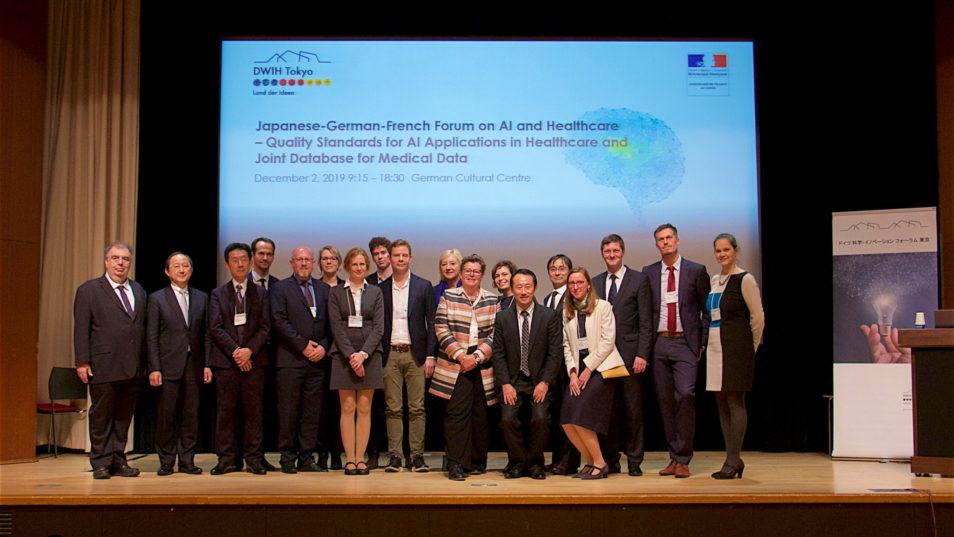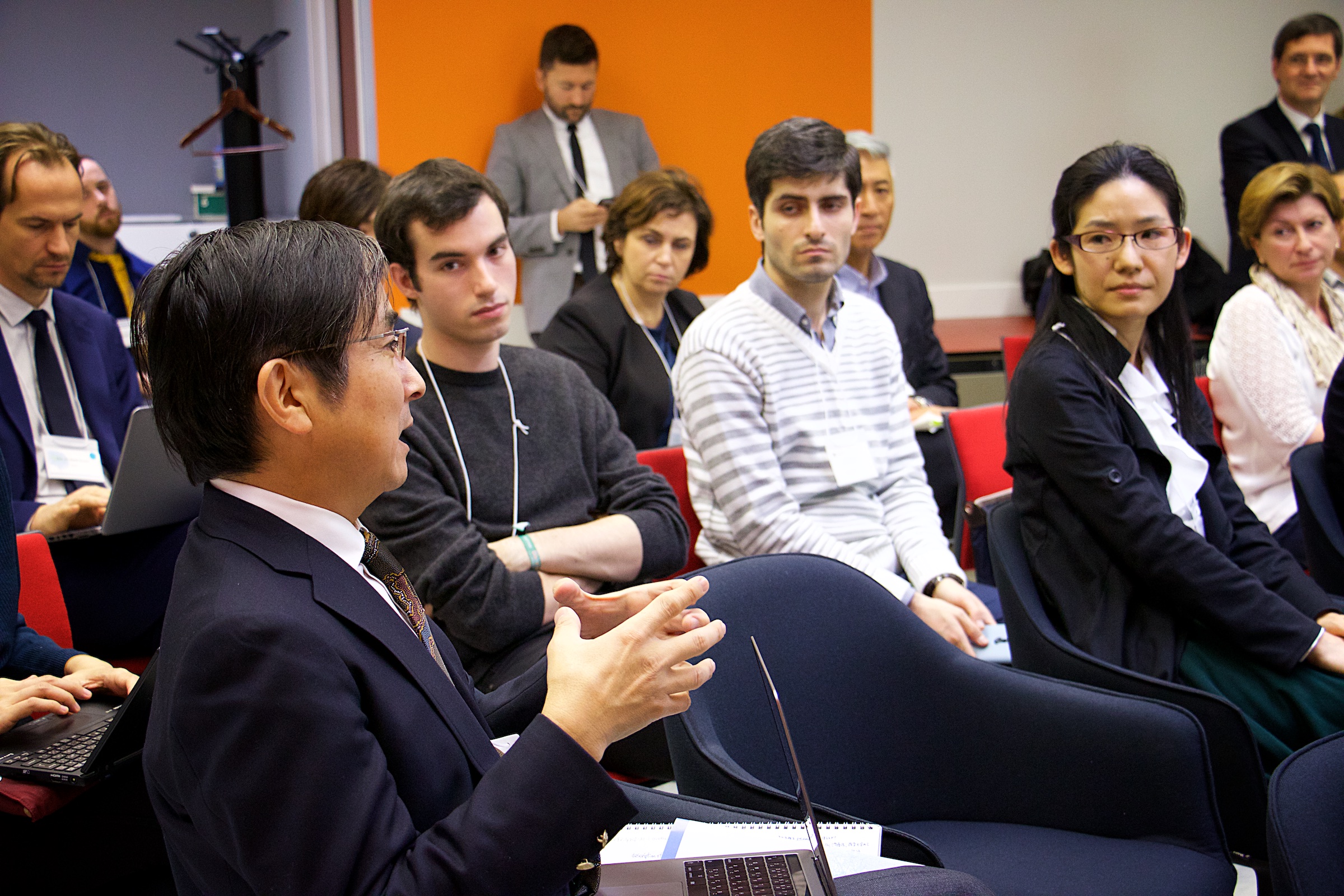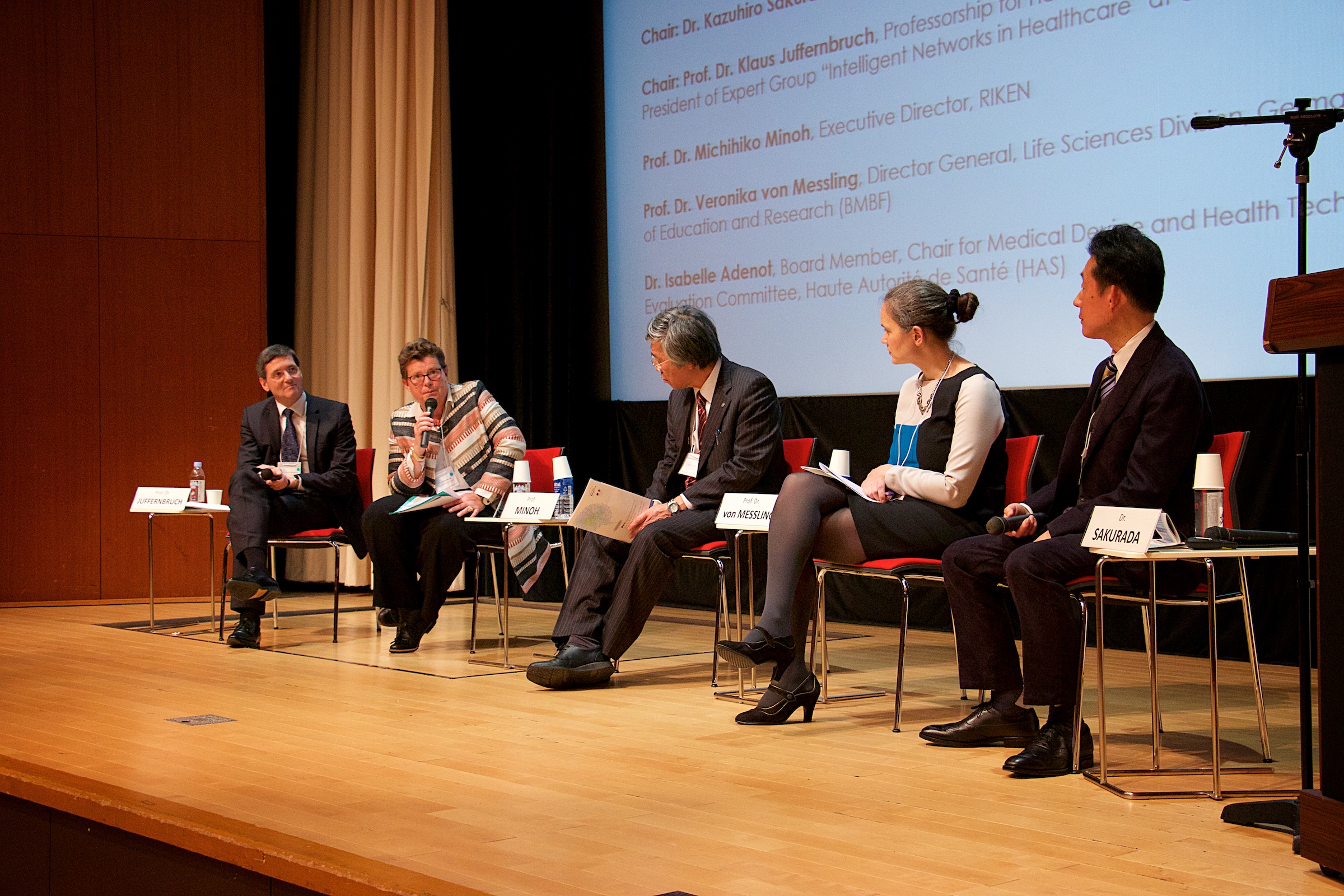AI in Healthcare Needs Quality Standards and Integrated Medical Data
 © DWIH Tokyo
© DWIH Tokyo
On 2 December, the German Centre for Research and Innovation Tokyo (DWIH Tokyo) together with the Embassy of France in Japan held the “Japanese-German-French Forum on AI and Healthcare – Quality Standards for AI Applications in Healthcare and Joint Database for Medical Data”.
With about 100 invited experts and 21 speakers, the trilateral forum kicked off a series of events that addressed various target groups across the digital healthcare sector under the joint title “Connecting Europe and Japan – Intelligent Healthcare Applications”. In the forum, representatives from the worlds of research and academia, policy and regulatory bodies, companies and consultancies, and research funding followed panel discussions and participated in working groups focused on two main topics: quality standards for AI applications in healthcare and a joint database for medical data.
During the opening, representatives of the German Federal Ministry of Education and Research (BMBF), the Japanese Ministry of Economy, Trade and Industry (METI) and the French National Authority for Health (HAS) introduced national policy frameworks, their rationales and government activities with regards to AI and healthcare. All of them acknowledged the potential of AI to advance patient care and relieve medical staff of routine work to enable them to focus on delivering personalised and participatory healthcare. At the same time, the speakers pointed out the challenges of ensuring data quality and privacy, winning the trust of patients and doctors, and achieving the interoperability of data systems. In his plenary speech, Yoshihide Esaki, Deputy Director-General of Healthcare and Medical Policy, METI, analysed how societal changes such as the ageing society and a higher incidence of lifestyle-related diseases are pushing up healthcare expenses, with the result that health policies today need to focus on measures of disease prevention and progression control.
In the first session, Prof. Dr Klaus Juffernbruch (Professorship for Health & Social Management, FOM University), President of the Expert Group “Intelligent Networks in Healthcare” at German National Digital Summit, chaired a discussion on the three countries’ approaches to standards and regulatory orientation to ensure the quality of clinical AI systems. Speakers explained how the evaluation of AI systems by authorities in Japan, France and Germany is built upon existing processes for medical devices and the areas where additional assessment grids have been developed. Of special interest were also questions on: How to keep the assessment up-to-date with AI systems constantly evolving beyond the stage at which they have been tested? What are adequate reimbursement mechanisms to incentivise further service or product optimisation?
Following the panel discussion, the audience joined working groups to look into specific fields for the application of AI in a hospital setting, clinical trials or data mining in cancer diagnostics and treatment.

As evaluation and training of AI systems need large pools of medical data, the second forum session was dedicated to the topic of integrated database solutions and interoperability between them. Dr Kazuhiro Sakurada, Deputy Program Director at the RIKEN Medical Sciences Innovation Hub, took the role of the chair to guide a discussion on the benefits and limitations of existing databases in Japan, Germany and France. Panellists presented the Medical Informatics Initiative in Germany (data interoperability between university hospitals), the French Health Data Hub (integration of health administrative and medical data) and evolving legal frameworks to promote the use of health data for the public benefit in Japan.
The working groups complemented these inputs with suggestions on how to provide a safe and transparent data-sharing system, how to stimulate entrepreneurial innovation using integrated databases and how to ensure the quality of the medical data fed into them.
The subsequent closing panel shifted focus to a meta-level perspective on “Expanding human intellect by combining artificial intelligence and humanity: New healthcare in the AI era”. Speakers discussed distinctive features of humans like intuition, empathy and creativity, which, along with intellect, shape their decisions. Though the question of whether AI can progress to the stage of taking on these features as well was raised, all panellists agreed that, in healthcare, AI’s work is complementary and designed to assist doctors and medical staff, rather than replacing them.

DWIH Tokyo conducted the forum with official support from the Ministry of Economy, Trade and Industry (METI), building on the continuous support provided by its official DWIH partners from Germany. The Embassy of France in Japan acted as a co-organiser of the forum. All speakers had the chance to further specify topics and projects for collaborative approaches between Japan, Germany and France in a closed expert workshop (3 December 2019) organised by the Embassy of France in Japan and supported by DWIH Tokyo.
The forum presented a follow-up to the First Japanese-German-French DWIH Symposium on AI (November 2018), during which participants issued a joint statement on a shared human-centred approach to AI. The Second Japanese-German-French Symposium on Artificial Intelligence is scheduled for 18-19 November 2020.
